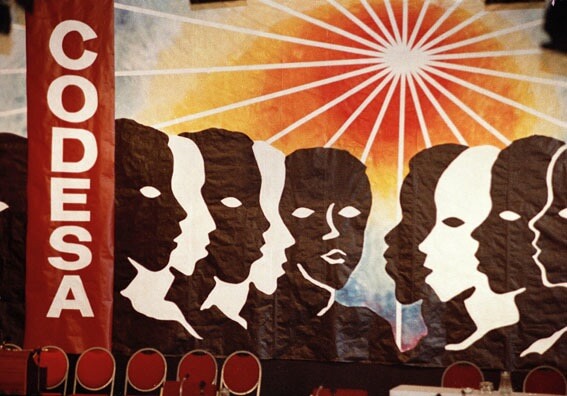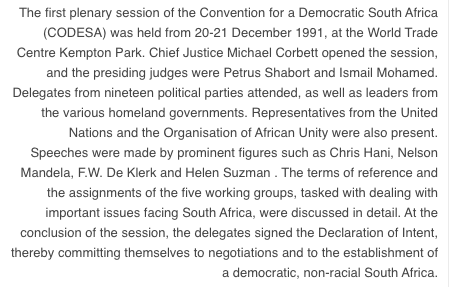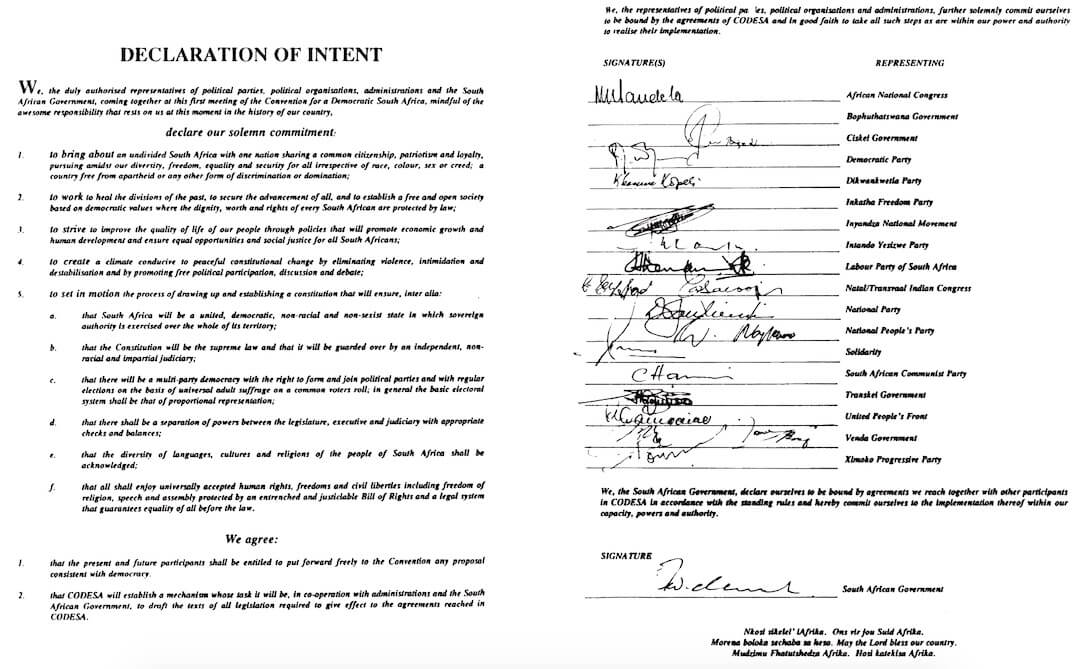The Story of CODESA
20 DECEMBER 1991

The logo:
A multi-coloured sunrise was the symbol chosen for CODESA to convey the sense of hope, energy, light, and life. “The sun had also been chosen for its neutrality. It came up every day for everybody regardless of their race, colour or creed,” said Saki Macozoma, CODESA’s media liaison officer.
The
opening:
The Chief Justice, Michael Corbett, opened the historic Convention. Two prominent judges presided over CODESA – Petrus Shabort, a white Afrikaner, and Ismail Mohamed, South Africa’s first non-white judge who had distinguished himself as a civil-rights lawyer. They were there to provide a dignified and non-partisan control over the proceedings and an important adjudicatory function in relation to decision-making.
Not all political
organisations were present:
The Pan Africanist Congress (PAC), the Azanian People’s Organisation (AZAPO), and the Conservative Party (CP) boycotted CODESA. The PAC believed that the African National Congress (ANC) was acting in cahoots with the National Party (NP) and that talks were a charade, while the CP abstained because it wished to prove that CODESA did not have the support of the majority of white voters. Over time, the CP became increasingly vocal in its call for a white, Afrikaner Volkstaat (homeland). A coalition of women’s organisations protested against the lack of women delegates at CODESA.
The representation
of women:
Of the 400 delegates at CODESA, only 23 were female. Women were outraged. Protests, pickets and petitions ensued. The combined pressure of the women eventually led to the establishment of a Gender Advisory Committee (GAC) in March 1992. The ANC Women’s League also galvanised an extremely heterogeneous grouping of South African women to fight for women’s inclusion in the negotiation process. The Women’s National Coalition (WNC) became a very important advocacy group.
How would decisions
be made?:
This was one of the most difficult challenges at CODESA. The ANC believed that decisions should not be made by the counting of hands, and opposed the idea that each of the parties present could have an equal vote. The mechanism of ‘sufficient consensus’ was a highly creative solution agreed to by all the parties. This principle basically meant that the two judges who presided over the convention would rule whether there was sufficient consensus or not. The NP also agreed that decisions at CODESA would be binding on the government and all parties, and Parliament would give legal force to these decisions.
The historic Declaration
of Intent:
In this first formal output of CODESA, delegates pledged themselves to an ‘undivided single South Africa’ in which the constitution would be supreme and regular elections were guaranteed. Cyril Ramaphosa called the declaration ‘the preamble of the first democratic constitution’. Others described this moment with an evocative Zulu phrase – ‘asijiki’ – no turning back. The two missing signatories to the Declaration – the Bophuthatswana government and the Inkatha Freedom Party (IFP) – were an indicator of some of the conflict that lay ahead. The former objected to the loss of the sovereignty of its homeland, while Chief Mangosuthu Buthelezi complained that the document pointed away from a federal system of government option which would affect the IFP’s control over its home province of KwaZulu-Natal.
ANC
“In the interest of moving as speedily as possible towards a negotiated peaceful political settlement … The ANC announced that it was now suspending all armed actions with immediate effect. As a result of this, no further armed actions and related activities by the ANC and its military wing, Umkhonto we Sizwe, will take place.”
-Nelson Mandela, then President of the ANC
Bophuthatswana government
“It is our sincere wish to participate and contribute constructively to the proceedings. It must be remembered however that we are a sovereign and independent country, whether it is formally recognised or not, with our own Parliament and legislative process and our own electoral system that meet democratic principles … We are therefore not legally competent to enter into any commitment or agreement which may result in the abolition of Bophuthatswana as a sovereign independent state or the possible merging of its identity with another or others.”
-President Lucas Mangope, then leader of the Bophuthatswana government
Ciskei government
“CODESA must be regarded …. As a voluntarily agreed upon structure which … Seeks to unite all leaders of political parties and governments within the broader South Africa who are committed to bring about a new South Africa through negotiations … The players must themselves negotiate until agreement is reached. Only then may decisions be binding.”
-Brigadier Oupa Gqozo, then leader of the Ciskei government
Democratic Party
“One of the great tasks CODESA must fulfil is to produce a constitution which prevents the abuse of power by the government … Those, if there are any, who have come to CODESA to pursue party political aims without regard to the great national interest will be cursed by generations to come. Those who have come prepared to abandon all narrow interests to the general good will have a place among the heroes.”
-Dr Zach de Beer, then leader of the Democratic Party
Dikwankwetla Party
“South Africans from all walks of life have never before in the history of their country been afforded such a historic opportunity to come together for an all-comprehensive purpose of negotiating a constitutional future for their country. The new order is already with us. There is now no turning back.”
-Dr T K Mopeli, then leader of the Dikwankwetla Party from QwaQwa
Intando Yesizwe Party
”We in the IYP, and certainly in other peace-loving and democratic formations, believe that for this Convention to yield any significant results, the will of the people should come first, and the personal will of us leaders should come last.”
-Prince J S Mahlangu, then leader of the Intando Yesizwe Party from KwaNdebele
IFP
“We should all support the President of the IFP, Dr Mangosuthu Buthelezi, who in his other role as traditional Prime Minister to His Majesty the King of the Zulus, had no alternative but to stand by his King and campaign for the acceptance of the rightful role of the Zulu people in reshaping South Africa.”
-Dr Frank Mdlalose, then founder member of the IFP
Inyandza National Movement
“[We are] ready and fully prepared to seize this golden opportunity CODESA affords us … To bring about, through serious negotiations in this forum, a united and unfragmented non-racial and democratic South Africa … We must all try to ensure that CODESA succeeds, but it has the potential of being derailed and undermined if the government of the day does not give legal force to CODESA.”
-Chief Minister M C Zitha, then member of the Inyandza National Movement from KaNgwane
Labour Party
“While CODESA is the most representative body South Africa has ever had, and whereas the South African government represents only 5% of the South African community, we cannot allow the decisions of CODESA to be vetoed by the government. The future requires us to be constructive, conciliatory and courageous, but there must be a firm commitment to one nation and one South Africa.”
-Reverend Allan Hendrickse, then leader of the Labour Party
Natal/Transvaal Indian Congress
“CODESA represents the hope and aspirations of our people to finally restore their dignity and humanity. Our people are tired of violence, division and mistrust. The political forces represented here have the responsibility to build trust and create a process which can categorically leave our gruesome past behind.”
-Mr G Sewpersadh, then leader of the Natal/Transvaal Indian Congress
National People’s Party
“Our regret is that there are empty chairs. CODESA is being boycotted and denigrated as a sell-out … It is our important task to accept this as a reality and mediate so that the empty chairs can be filled with people from the PAC, AZAPO, the AWB, the Conservative Party, and others. They should know that CODESA hasn’t a closed agenda.”
-Amichand Rajbansi, then leader of the National People’s Party
Solidarity Party
“The world is littered with far too many monuments to failed democracy and we should therefore refrain from repeating such experiments. To fail to act wisely now is only to ensure having to act desperately later. This is the challenge that faces us today. The future must be given a chance.”
-Dr J N Reddy, then leader of the Solidarity Party
South African Communist Party
“The oppressed and working people long for peace. They long for an end to violence. They long for their freedom that has long been denied … We are in this process because there are a majority of South Africans who do not have a say in the rules governing their own lives. We are in this process because there are millions of South Africans who need a new government that will listen to their needs.”
-Chris Hani, then leader of the South African Communist Party
Transkei government
“Transkeians have always regarded themselves as part of South Africa … Transkei therefore has braced herself for the sacrificing of her present constitutional status in favour of re-incorporation. However, she must be part of the debate and process of re-incorporation in order to ensure that she does not re-join an apartheid South Africa.”
-Major General Bantu Holomisa, then leader of the Transkei government
United People’s Front
“It will absolutely serve no purpose to look back in the past in our pursuit to shape a new political dispensation … I believe that CODESA is here to unite and not to endorse or perpetuate separation of the people of this country.”
-Chief Minister Ramodike, then leader of the United People’s Front, Lebowa
Venda government
“We should all commit ourselves to establishing a transitional arrangement mechanism … The proceedings of this Convention will be constructive and that there will be a spirit of goodwill and mutual trust.”
-Brigadier Ramushwana, then leader of the Venda government
Ximoko Progressive Party
“The XPP approaches CODESA with a sense of both profound enthusiasm and relief … Let us make CODESA a marketplace of ideas, a marketplace of unity.”
-Professor H W E Ntsanwisi, then leader of the Ximoko Progressive Party
SA government
“In working groups and plenary sessions we shall thrash out the procedures, methods, and the substance of the irreversible constitutional process in which we are involved. Success or failure will be determined very largely by the will of the delegates to find one another by means of giving and taking.”
-President FW de Klerk, then leader of the National Party
The gloves-off
exchange:
Directly after the signing of the Declaration, FW de Klerk made a hard-hitting speech, emphasising that the ANC was ‘an organisation which remains committed to an armed struggle and cannot be trusted’. When De Klerk had finished, Nelson Mandela lambasted him for violating an undertaking not to discuss the armed struggle at that stage. Pointing his finger at De Klerk, he said with barely controlled anger, “This man is not to be trusted”. CODESA delegates listened to Mandela’s fury, motionless. De Klerk struggled to control his voice as he took to the podium saying that the disagreement was an example of ‘how democracy should work’. He made an impassioned plea for goodwill at CODESA.
In their own words
“Some members of the NP-delegation looked miserable, as if they had been dragged there against their will. They were clearly not excited about this historic moment. This forced the NP on the back foot and there it would stay till the end of the process five years later when the Constitution was signed in the George Thabe Stadium
in Sharpeville.”
-Leon Wessels, then Deputy Minister of Foreign Affairs and lead NP negotiator
“Any attempts by CODESA to enforce its illegitimate discussions or actions will be considered as an act of war … If ever the peace-loving and law-abiding Boers [Afrikaners] were to be aroused into resistance and total rejection of this renegade government, we have now arrived at that moment in our history.”
–Afrikaner Weerstandsbeweging statement, 1991
“The PAC had joined forces with the ANC to form a Patriotic Front (PF) just a few days before CODESA. But they withdrew, insisting that the Convention should be held outside SA and should be chaired by a neutral party. They argued that the two judges who had been appointed to chair it were functionaries of the state. When the ANC joined with the NP to override this objection, the PAC walked out, accusing its PF partner of colluding with the forces of apartheid. This was to become a pattern from that moment on – once the two major players had agreed, the process continued.”
-Leon Wessels, then Deputy Minister of Foreign Affairs and lead NP negotiator
“As negotiations continued, we were divided in the PAC. Some felt that negotiations and struggle or revolutions are not mutually exclusive … And some were rigidly fixed to the position that if you are a revolutionary you cannot negotiate … We hoped that down the line, De Klerk may see a need to go back into the ‘laager’, the ANC will be seen as a sell-out and their support may tilt towards
the PAC.”
–Letlapa Mphahlele, then Director of Operations, Azanian People’s Liberation Army, the armed wing of the PAC
“CODESA gave tremendous impetus. We succeeded in bringing most of the parties together and getting them to be committed. A kind of atmosphere started to grow in South Africa, emphasising negotiation as opposed to an armed solution. The world was quite amazed … They thought these Boers are too stupid and the ANC is too belligerent, and they couldn’t understand this coming together.”
negotiating team
“I didn’t sleep the night before the actual negotiations started … What kept me awake was not the cheerlessness of the venue. It was fear. My deep dread was that, after all the generations of struggle … That we would give away in a few weeks at the negotiating table all the gains we had won through strenuous travail over the decades in the trenches. I thought of my close comrades who had been tortured to death or assassinated … Would we betray their memory?”
–Albie Sachs, then member of the ANC Constitutional Committee
“All of us were there to negotiate a future for South Africa. We had to come out with one constitution – not the ANC or the DP or the NP or the traditional leaders’ constitution. We had to listen but we in the ANC were very clear that we were the majority party negotiating together with the regime so that’s why we developed things like sufficient consensus because we realised we can debate all these things forever but we have to reach a conclusion. Of course the IFP didn’t like this.”
-Mavivi Myakayaka-Manzini, then member of the ANC Women’s Section and the Constitutional Committee
“The exclusion of women in the CODESA process is both a symbol of our present society and a grim warning of the future. They will talk of non-sexism, they will not practise it. The air around us is thick with talk of change, of the end of racism and apartheid, of a new era of democracy. Is the change we are talking about going to mean simply adding some black men where white men
sat before?”
-Frene Ginwala at the launch of the Women’s National Coalition, April 1992
“Very distressing, quite shocking, and typical of our patriarchal society. Yesterday I attended a steering committee as an advisory. There were 20 male delegates—but the two women present attended as advisors. When I was observing all the different delegation offices, the high number of women in the administrative and typing positions became very obvious. Women at the delegation offices are good enough to type up reports and answer telephones, but our sex does a mysterious disappearing trick at the higher planning levels
of CODESA.”
–Thenjiwe Mthintso, then member of the SACP delegation to CODESA on the absence of women












